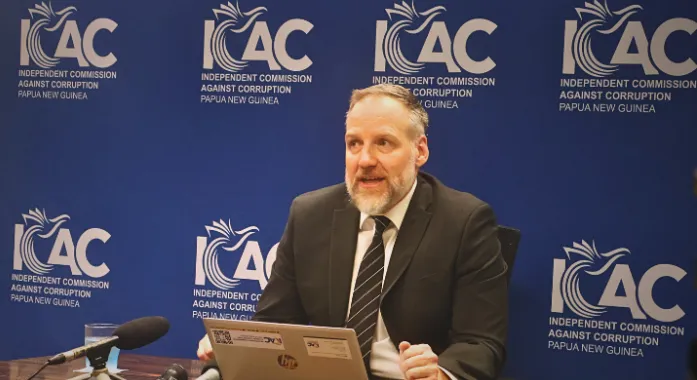Amid a growing national wave of anti-corruption sentiment, Papua New Guinea (PNG) faces a troubling reality: the country’s Independent Commission Against Corruption (ICAC) has been effectively sidelined over the past 12 months.
When ICAC was first established, the national government heralded it as a major milestone in the fight against corruption, earning the trust of both international development partners and the local public. However, the current situation is a stark contrast to those early promises—the once-hopeful institution is now being met with systemic neglect and resistance.
ICAC Deputy Commissioner Daniel Baulch offered a sobering account of the situation: “Our letters and requests are ignored, meetings cannot be held, and judicial processes are delayed. Even obtaining a search or arrest warrant can be deliberately obstructed.”
He continued, “Over the past year, we’ve submitted institutional frameworks, drafted national response plans, and sought high-level coordination to combat the widespread corruption and criminality in PNG. But without cooperation, none of this can move forward. Many people say ICAC is PNG’s last hope. We are trying to live up to that responsibility, but we cannot fight this battle alone.”
Baulch’s words—“We are trying to live up to that responsibility, but we cannot fight this battle alone”—lay bare the isolation and helplessness ICAC currently faces.
He appealed to government officials and all public sector leaders: “Please cooperate with your anti-corruption institution. Don’t be part of the problem—be part of the solution. Do it for the people, the country, and the generations to come.”
When questioned by the media about whether ICAC has been too passive in its operations, Baulch responded firmly: “We won’t wait. ICAC has the authority to initiate its own investigations. If we believe a case falls under our mandate, we will intervene. Bring us your testimony, evidence, and reports—we will follow through.”
But the real issue is not whether ICAC has the right to act, but whether it can. Legal authority without executive support is nothing more than a castle in the air.
Baulch bluntly pointed out, “They’re not reporting corruption, even though under the Leadership Code, they have a legal obligation to do so.”
He specifically referenced a recent wave of headlines involving high-ranking political figures accused of corruption over the past two weeks.
One such case involved a letter allegedly from the then-Minister for Treasury, instructing the release of approximately K73 million in outstanding payments to several companies. Days later, the Prime Minister intervened to stop the payment. That minister has since been replaced.
Even more concerning were reports alleging that a current minister engaged in vote-buying during elections, offering vehicles and cash in exchange for political support.
Yet, despite the gravity of these incidents, ICAC has not received a single formal corruption report.
“Silence speaks volumes,” Baulch remarked.
He added, “According to Section 451 of the Organic Law on the Independent Commission Against Corruption, all leaders bound by the Leadership Code are legally obligated to report corruption to ICAC. But what we’re seeing is a clear dereliction of duty.”
In PNG—a country rich in resources but fraught with governance challenges—the cost of corruption goes far beyond financial loss. “Corruption means people don’t receive help. It means no healthcare, no education, no employment opportunities. It fuels violence, and in some cases, even results in death.”
Even more ironic is that although ICAC is legally empowered, its implementation efforts have been stonewalled repeatedly. “Despite our continuous calls for legislative cooperation, we have received no response,” Baulch noted.
This fight against corruption has become a lonely, uphill battle—one being waged by a few, against the many.
Editor’s Note from MEET PNG:
A nation’s anti-corruption framework must be more than words on paper. It must never be reduced to political window dressing. ICAC’s current predicament demands serious national reflection: Does PNG want an anti-corruption body with real teeth—or merely a slogan to use in diplomatic negotiations?
The international community must also pay close attention. PNG’s anti-corruption reforms must not be allowed to drown in the swamp of formalism. Without eradicating corruption, there is no future for the nation.


